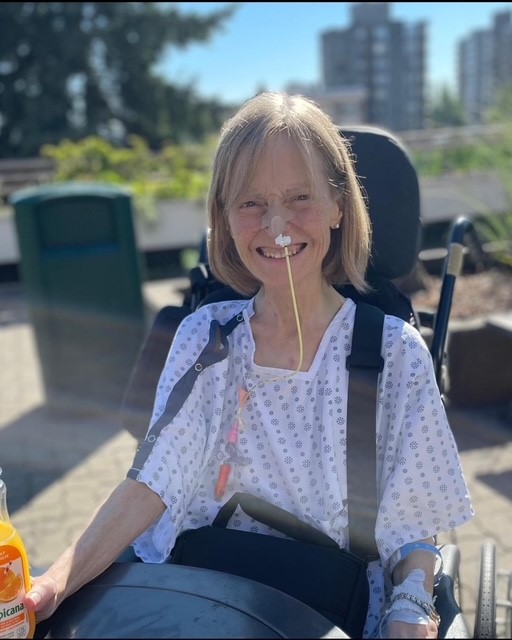If anyone knows what to expect on a journey with heart failure, it would be Karen Alden. Not only was the Aldergrove woman a cardiac operating room nurse for two decades, her father also had heart failure and was at one point considering a heart transplant.
“All along my journey, I would look at my paperwork and think, ‘This should be done,and this should be done.’ I looked at it like I was caring for a patient, not myself,” she laughs. “One of the best things was I felt comfortable with who was taking care of me. I knew Dr. [Jamil] Bashir, one of my cardiac surgeons, from when he was a resident and I had scrubbed in with him!”
Karen, now 59 years old, lived with heart disease for many years, undergoing several procedures along the way, including a pacemaker, defibrillator and tried multiple medications. It bought her some time, but by 2023, things got really serious. Karen was no longer able to work. She was in and out of emergency, until the time she wasn’t able to go home.
“I don’t remember a lot about that day. I was transferred to St. Paul’s Hospital. I know my friends and family were there and a couple of cardiologists I knew. They thought I wouldn’t make it through the night and even had to intervene with emergency measures three times,” explains Karen.

Karen was rushed into surgery for an artificial heart pump, a left ventricular assist device (LVAD), that would keep her alive until she could receive a heart transplant.
Recovery was tough. Karen had to relearn how to walk and talk. Her brain was foggy. Regular daily activities were challenging. Ironically, the LVAD was working so well that the right side of her heart couldn't keep up. The rest of Karen’s body struggled. She simply needed a new heart.
“I must have subconsciously been thinking about my death. I tried to get my will together, I’d look at my messages on Facebook and think ‘When I’m gone…’ During that time, my family suffered a lot more than me, especially because they had gone through much of the same thing with my dad years ago,” recalls Karen.
(Karen’s dad had ultimately decided not to proceed with a heart transplant and passed away a short time later.)
By this time, Karen was frail and her kidneys were shutting down. She had to go on dialysis, though she was so out of it she didn’t even realize until she saw photos later. Karen was “practically in the grave,” as she describes it. Karen’s medical team considered removing her from the waitlist because they weren’t sure she would survive the surgery.
“Then a heart became available. It was Easter weekend so I call it my Easter weekend miracle,” remarks Karen. “I was really out of it at that point but I remember my family and my husband were crying. He had tears streaming down his face. It was so emotional. I don’t think it really hit me until afterwards.”
It took Karen six weeks to get well enough to go home, as she had several complications, but in May 2024, she was discharged from St. Paul’s.
Karen’s journey has come full circle. A long-time supporter of organ donation because of her father, Karen always tried to encourage health care colleagues to learn more about organ donation. When she moved to B.C., her first job was on a bone marrow transplant unit. She also cared for organ donors as an organ retrieval assistant at BC Transplant. She can still clearly recall those donors and their families.
“I remember one family came to the operating room with their loved one, a child. They wanted to take photos and videos so they could make an album and they were there when we did the moment of silence,” she says. “Then they came back after the recovery to see the organs go out for transplant in the red cooler bags.”
Karen grew up in Saskatchewan, so news of the Humboldt Broncos bus crash and Logan Boulet’s last acts of kindness hit close to home. Logan saved six people’s lives, which went on to inspire hundreds of thousands of people to register as organ donors. Karen was deeply moved by this.
“To all the families on the donor side...it’s a very precious gift. So precious that, because of it, I’ll be able to see my niece graduate, and my nephew get married. I will get to do all those things because someone gave me a heart. I was so close to death. I definitely want to pay it forward. I am incredibly grateful.”
Karen wants to educate other nurses and health care professionals and continue raising awareness about the importance of organ donation.
“My whole life has led me to this point...and everything I have done along the way has all contributed. I am now taking the opportunity to give back and be involved as much as I can.”
—-----
Karen was one of 25 British Columbians to receive a heart transplant in 2024. As of January 31, 2025, there are 11 people on the waitlist for a heart. If someone you loved needed a life-saving organ transplant would you want there to be one available? Please register as an organ donor. It takes just two minutes and your Personal Health Number.
Register now

